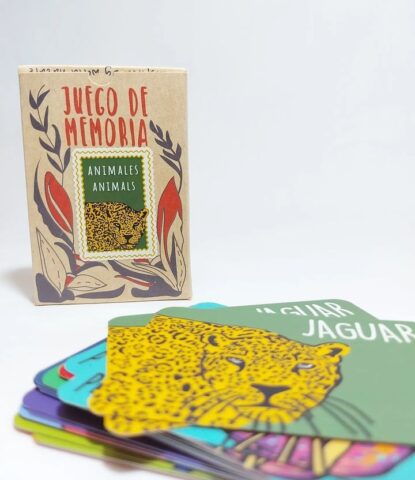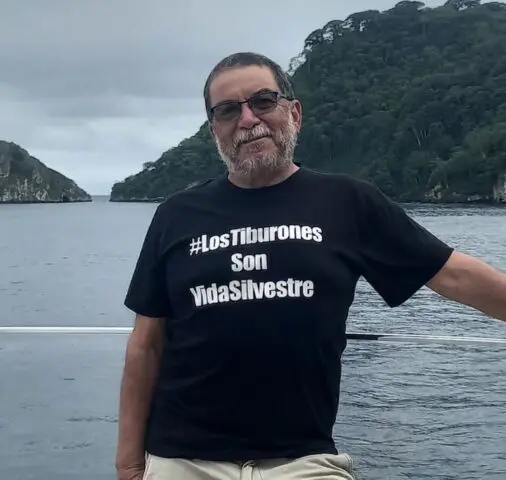On the occasion of the Blue Day celebration in Costa Rica, approximately 40 organizations joined together to hold a demonstration and vigil for sharks and the health of the Costa Rican ocean.
The demonstration went all the way to the Legislative Assembly, and the vigil did not lack artistic practices as a means of generating sensitivity to the situation of marine species, including hammerhead sharks.
The important issues discussed in the activities were the protection of endangered marine species, the Legislative File 21.754 and the Reform to Article 1 of the Wildlife Conservation Law, which have been on the table for several years and have been a challenge due to “illegal actions” of institutions.
The occasion was an opportunity to talk with two great Costa Rican environmental fighters, the entrepreneur and artist Zelina Fontana and the biologist Randall Arauz, who have worked for the health of the oceans and the protection of its fauna, and were also organizers of the various activities of the Blue Day.
Zelina and her art as a neutral point to debate such a vulnerable subject as sharks.
Zelina Fontana, creator of Dodo Illustration, is dedicated to illustration, graphic design, product creation and making art in film and advertising, her life is painting, drawing, creating environmental awareness campaigns and began her fight for the protection of the oceans in 2015.
She is from San Jose, but as he likes to travel around the country, he is always on the go.
Fontana, regarding the actions they are taking, emphasized that the main objective is to get the deputies to resume in the plenary the discussion of the reform of article 1 of the Wildlife Conservation Law. Why? “Because they are not taking into account that sharks are wildlife, so our purpose is to get the deputies to come to their senses and designate sharks as wildlife.
The most delicate is the hammerhead shark, but also the silky shark and the thresher shark are in danger of extinction, so the truth is that we speak on behalf of all sharks in Costa Rica and the world, since this is a country that stands out worldwide for its protected areas”.
On the Blue Day, the organizations were in meetings through Zoom, “we had a conversation, a get-together about sharks and several organizations met there, there are more than 40 of us in a chat where we talk to each other and pass shark news with which we update ourselves and that day we reached the assembly, with an open space for musicians to play, of course with the idea of giving art to the demonstration”, explained Zelina.
Why was art present in her Blue Day activities?
For the Costa Rican illustrator, art in any activity is that point, that neutral space, where you can discuss an issue as vulnerable as that of sharks, because in her opinion, they have a socio-environmental, cultural, environmental, ecosystemic problem in its broadest sense, “the human being in relation to the marine environment is in conflict and we are depleting resources. Fishermen don’t get along with conservationists and conservationists don’t get along with politicians, so art is the place to celebrate and unite with a single focus.
Why did you get involved in the environment, specifically the oceans?
Zelina’s interest in the oceans arose after being part of a project to enumerate how many sea stars there were in Bocas del Toro, where she was able to observe up close the cultural and socioeconomic problems. She was shocked by the concerned reaction of the nearby communities when she learned that there are fewer sea stars.
From that moment on, she saw the need for the presence of an artist, or many artists, because in her opinion, the brand she promotes is a means of translating all the raw data that the communities, fishermen and researchers gather, so that there is a greater approach to the marine world.
“Since that time I came out of that monitoring of stars, when I went from diving to land, I asked myself, what can I do about it? What I know how to do is draw, I’m going to turn all my potential into translating that language that is needed to be able to communicate and thus raise awareness about the environment. In 2016 I had an approach in Cocos Island, I established a relationship of love and admiration for the island, everything that surrounds it, its flora, fauna, its cloud forest, it is also necessary to defend its sharks” Fontana concluded.
Randall Arauz, his knowledge and work as a biologist, his fight and his arguments
Randall Arauz, a Costa Rican biologist, has a Bachelor’s degree in Biology and a PhD in Marine Sciences, has been working on marine conservation issues since the 90’s, has 30 years of experience and has more than 80 scientific publications that have to do with nesting turtles and their migratory movements, also sharks and manta rays.

In 1997 he founded the Pretoma Organization, which was a very strong NGO that was active until 2013, and since then he has been working as a consultant for different international institutions. Like Zelina, he is interested in Cocos Island and has made 58 research trips there and to the southern part of the Nicoya Peninsula.
Now, what about Article 1 of the Wildlife Conservation Law?
Randall, is a very prepared person on the subject of ocean protection laws due to the time he has dedicated to work for it, in fact, during the conversation we had with him, he made special mention of what happened in 2012 during the Government of Laura Chinchilla 2012. The Costa Rican biologist started working with the government, which was already talking about shark protection, and that is why some reforms were taken to the Legislative Assembly for the Wildlife Conservation Law.
One of the reforms was to Article 1, paragraph 4, which states: the Wildlife Conservation Law does not apply to commercial species; The language of the article caused Arauz concern, so he was determined to appeal in the Assembly, but according to state lawyers, friends of his, he was told that “he should stay calm because what was written was right, because the law does not apply to commercial marine species, but according to the jurisprudence of the constitution, a species in danger of extinction cannot be commercialized and what the Fourth Chamber said in 1999, that commercializing a species in danger of extinction such as the green turtle, was against the precautionary principle and therefore, was illegal in the country”.
Article 71 of the Wildlife Conservation Law, grants the Ministry of Environment what is called the steering role over wildlife in Costa Rica, everything related to agreements, writing and issuing any type of regulation, is the responsibility of the Ministry of Environment.

Arauz also emphasized that the Wildlife Conservation Law states that “national and international trade and capture is prohibited, as well as the possession of any species that is protected by the Cites Convention, which is the Convention for the international traffic of endangered species”.
In 2012 when reforms were made to the Conservation Law, according to Randall, there was already a concern in the fishing sector, “because years before I won an appeal with other biologists and conservationists in the Constitutional Court because here in Costa Rica they allowed the killing of 1,800 green turtles per year, between July, August and September in the province of El Limón. 800 green turtles per year, between July, August and September in the province of El Limón and I, at that time I was just starting my career, and I said to myself, how is it that they allow killing green turtles if they are in danger of extinction recognized as such by the State and are in Cites?

In that year, when the green turtles were involved, the fishing authorities told Randall Arauz that the turtles were not wildlife, that they were commercial species, part of the Caribbean culture, that they ate turtles as part of their tradition, that they had been doing it for centuries, that this was never going to stop and that they could not be protected by the Conservation Law.
Let’s remember that, in Costa Rica, you cannot have a parakeet, a monkey, any type of wildlife, not even as a pet, because everything is protected, and here sport hunting is also prohibited.
The outstanding biologist from the Central American country was appointed by Laura Chinchilla’s government as scientific delegate to Cites, “they sent me to Thailand and I met the Minae technicians, because as the governing body, I was the scientific advisor and we put on the table to protect the hammerhead shark in this Convention made up by 188 countries; The Convention needs two thirds to vote in favor and we achieved that, it was a great victory, Costa Rica was the champion of Marine Conservation and that is something natural because it is what the world expects from the country, everything went well, we made coalitions and everyone joined”, he said.
Laura Chinchilla also proposed to protect hammerhead sharks in the Cites Convention.
Randall and the entire team that accompanied him succeeded in banning the export of hammerhead shark fins or products, which in March 2015 “made the government nervous because of our efficiency”.
In 2016 came another Cites meeting, (there the meetings are every three years), the conference of the parties number 17 of that year and other countries proposed the protection of the silky shark and thresher shark. “The silky shark is about 80 % of the sharks that Costa Rica lands and the thresher shark is about 10 % more, the protection of these marine species was also achieved, which was an interesting situation because, in that year, the country was opposed to everything in Cites, it was opposed to protecting sharks.
Everyone was wondering what happened to Costa Rica, the situation was so complex that previously the country fought with Asian countries, now it turns out that it sits next to them hindering the protection of sharks” added Arauz.
In view of the restriction of fishing, a decree was enacted
The Costa Rican biologist, also highlighted that -because of the efficiency they had had with the increasing restriction of fishing-, InstitutoCostarricensedePesca (Incopesca) enacted an Executive Decree 4379 in May 2017, highlighting that -sharks are not wildlife and that the stewardship over the marine species is them (Incopesca) and not the Minae, “with this they snatched the stewardship from the Minae, so it has nothing to say about sharks, all conservation policies now regarding sharks have to be through Incopesca”.
For Randall, a decree is being used to change a law, “which is a violation of the principle of normative hierarchy, a decree can never change a law, a law can only be changed in the Legislative Assembly” he questioned.
Faced with this situation, Arauz and organizations filed a complaint in court in September 2017, and the process has lasted six years. In 2019, they went to the Legislative Assembly to the Popular Initiative office and said, they wanted to push for changes in the Wildlife Conservation Law and that is the proposal they maintain today. “The law says that it does not apply for commercial marine species, well but we want we are proposing that it says, “it does not apply for commercial marine species, except when the species have been declared in danger of extinction, in that case they have to be protected by the Minae”.
Good news!
At the beginning of 2021, the proposal of Randall, Zelina and organizations was approved by the Environment Commission and passed from the Secretariat to the plenairy, but in August when the project was ready to be called for a vote, the Puntarenas deputies with 8 more deputies, took it upon themselves to return the project to the Environment Commission.
“While we are doing all the work, in June of this year, our Court resolution came out (the complaint that was made in 2017 and that we achieved a hearing in 2021), finally came out to give now in the First Chamber, in a Court of Appeals and said Chamber is giving us all the reason” informed Randall.
The Court supports them in that sharks are wildlife, annulled the improper for going against national laws and orders Incopesca and Minae to protect sharks in danger of extinction with the Wildlife Conservation Law and the Biodiversity Law.
“We have an institution like Incopesca issuing regulations, which is illegal, contrary to what our laws say and also, we have an institution like Minae passive, which has allowed its authority to be taken away from it staying quiet”.
Finally, biologist Randall expressed that the authorities have been reluctant to execute the sentence, “they will probably require another denunciation and, on the other hand, we have the mess of the Legislative Assembly:
Our deputy friends want to help us and what we are trying to do right now, is to return the project that is in the Environment Commission back to the plenary, and if we achieve this, in the next few days, it is already an achievement for our oceans and their marine species, especially sharks. We believe it can be achieved, we believe in Costa Ricans, also in the System and in science; if science and the law prevail, we really should not have such a problem!
Beyond everything, the sentence needs of course that the vote is positive for it to go to the plenary, and if it goes, they have a month of time to get the project approved. Definitely everything seems a challenge, but any action that adds up, that is attached to the laws and good causes must have a majority support.


